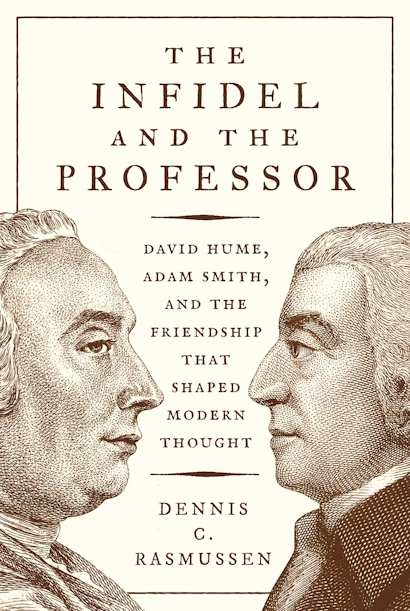The Union Betwixt
Somos nuestra memoria,
somos ese quimérico museo de formas inconstantes,
ese montón de espejos rotos.
[We are our memory,
we are that impossible museum of shapes that constantly shift,
that pile of broken mirrors.]
~Jorge Luis Borges1
The Illusion of Conscious Will
Last lesson, we learned that new theories about how the universe works (determinism, indeterminism) have led some philosophers (and physicists, psychologists, neuroscientists, etc.) to question human free will. But the attacks don't only come from physics. One of the most forceful recent arguments against free will comes from psychologist Daniel Wegner. His book The Illusion of Conscious Will, originally published in 2002, was recently re-published (2018). In it, he gives a sophisticated account of how the brain produces our choices, as well as the subjective experience of choosing. His argument is complicated and surveys experimental data from many domains of psychology, and so I can't give a summary of his view that gives justice to his writing. What I can say is the following. First, he clearly sides with the compatibilists. He believes that the will is "not some cause or force or motor in a person but rather is the personal conscious feeling of such causing, forcing, or motoring" (p. 3; emphasis added). He goes further and claims that if one is looking for the cause of our actions, then one will not find what the libertarian is looking for.

Wegner's apparent
mental causation model.
Wegner believes that there are multiple systems associated with the production of an action. One psychological system "presents the idea of a voluntary action to consciousness and also produces the action" (p. 57). But this whole system operates in a non-conscious way, with the "self" playing no causal role. All our "self" is aware of is of the idea of a voluntary action (which it didn't produce but passively received) and the perception of its body engaging in some behavior (which it also didn't produce but merely passively received.) The interested student can see a diagram of Wegner's model pictured right (this model can be found in Wegner 2018: 63).
Wegner's model is intuitively plausible if one admits that the human brain is essentially an engine for generating predictions—that is its evolutionary function. And so, the system that produces the action (or some other related system) also produces the thought of performing that action and presents it to your consciousness. This is, in effect, the system's prediction of what the action will look like. And it is this coupling of the prediction of what the action will look like and the decision to engage in the action—neither of which came from the "self"—that gives the "self", the seat of consciousness, the feeling that it is in control. It feels like we intended to perform the behavior, and this intention makes use assume that the self is the cause of the action. But this little causal story is just a confabulation, or fabrication.
"The experience of will could be a result of the same mental processes that people use in the perception of causality more generally. The theory of apparent mental causation, then, is this: People experience conscious will when they interpret their own thought as the cause of their action. This means that people experience conscious will quite independently of any actual causal connection between their thoughts and their actions" (Wegner 2018: 60).
The Great Infidel
One of the most popular defenders of compatibilism was the Scottish philosopher David Hume. Hume began his philosophical career with the publication of his A Treatise on Human Nature, published in three volumes from 1739-1740. In this work, Hume sought to establish a brand new science of human nature that would undergird all other sciences, since—Hume reasoned—all other sciences rely on human cognition as part of its investigations. In other words, since all science begins with human experience and cognition, it is important to get our ideas straight about these first. But Hume makes the case that reason cannot truly take us to a complete knowledge of the world, as René Descartes famously believed. Rather, he believed that the experimental method is the only appropriate way. In other words, he made clear that sensory experience is at the root of all knowledge. In this belief, Hume himself acknowledged that he was not the first, counting John Locke, Bernard Mandeville, and Joseph Butler as predecessors. But Hume took it far further than they did.

Hume concluded that if we reject the idea of courageous reasoning (that reason can take us to fundamental truth about reality, morality, etc.), then it turns out we can know very little about the world and ourselves with certainty. Hume's conclusions must've been extremely disconcerting to readers in the 18th century. For example, here are some things that we cannot be certain about per Hume: the reality of the external world, the constancy and permanence of the self, and that the laws of causation (cause and effect) are real. In early editions of the Treatise, Hume even had sections denying the existence of souls and arguments against the reality of miracles—sections he had to omit for fear of repercussions. In the end, Hume concluded, all that reason can come to know on its own are mathematical propositions and axioms of pure logic.
The great diminution of the role of reason in Hume’s system correlates with an expansion of the roles of custom, habit, the passions (what today we would call emotion), and the imagination. In other words, what some philosophers explain through reason, Hume explains through the mundane habits of culture. Moreover, since Hume doesn’t include the supernatural as part of his explanatory scheme, the work is purely secular. Thus, Hume is implicitly making the case that God isn’t necessary when explaining human nature—an invitation to accusations of atheism that would cause trouble for Hume throughout his life.
In volume 3 of the Treatise, which was the volume that was added later, Hume gives his views on morality (also without need of God). Virtues are merely those character traits that we collectively have deemed to have utility (i.e., usefulness) in society and in our interpersonal relationships. We are predisposed somehow to find these agreeable, and to find vices disagreeable—an extremely interesting argument given that this is all before Darwin's theory of evolution. It is our passions that flare up when they perceive virtue or vice, feeling approbation (i.e., a feeling of approval) for the former and disapprobation for the latter.

Unfortunately for Hume, the Treatise fell “deadborn in the press”, failing to secure commercial success. Hume then became a tutor and then a secretary to a distant relative during a military campaign. He then returned to Ninewells, his family's estate, and began working on the Enquiry Concerning Human Understanding, a rewrite of Book 1 of the Treatise. Whereas Hume says he deliberately “castrated” the Treatise, ridding it of its most controversial sections, Hume left them in the Enquiry Concerning Human Understanding. And so we know his views on, for example, miracles. Hume also delivers his objection to intelligent design in this first Enquiry. Put simply, Hume says we cannot rationally infer from the imperfect nature of our world that there is a perfectly knowledgeable and loving creator—the lamentable aspects of this world are too numerous to justify this inference. Moreover, even if we did infer some intelligent designer, there is no way to move from this belief to other religious doctrines, such as the existence of heaven and hell. Again, a skeptic until the end, Hume does not argue that God and heaven don’t exist; just that you can’t know that they do if they exist. They are untestable and, hence, useless hypotheses.
As is plain to see, if Hume wasn't a downright atheist, he was very close by. And this is the intellectual framework into which his compatibilism fits in. He saw free will as merely a harmony between our desires and our actions. There is no special causal power to free will, like the libertarians claim. It's just the sense that we are able to do what we want to do. Here it is in his own words:
"By liberty, then we can only mean a power of acting or not acting, according to the determinations of the will; that is, if we choose to remain at rest, we may; if we choose to move, we also may. Now this hypothetical liberty is universally allowed to belong to every one who is not a prisoner and in chains."
In short, as long as you can act on your desires, you have (compatibilist) free will, even if you don't choose your desires...
Decoding Compatibilism

Food for thought...

Summary of why compatibilism isn't what we want
Here are, once again, the three reasons why compatibilism isn’t a good option for us, given the goal of this course: escaping skepticism.
-
First off, although compatibilism goes back to the Greek Stoics, the view was made very famous by 18th century Scottish philosopher David Hume. This might not initially seem like a very good reason for rejecting compatibilism, but it will seem stronger after a bit of context. Hume provided some of the most forceful arguments in the history of Philosophy for various skeptical conclusions. More importantly, compatibilism is part of his worldview—a worldview that challenged the Cartesian worldview at basically every turn. As a matter of fact, the way in which I have defined compatibilist free will is actually Hume's conception of free will, which is why I will refer to it as Humean-style free will from now on. In his A Treatise of Human Nature, Hume builds his arguments against several elements of the Cartesian worldview that we are currently trying to defend, such as deductive certainty about the world and that reason is the foundation of all knowledge (a view otherwise known as rationalism). In short, if we are trying to see if the Cartesian project can be successful, then Hume is not an ally. He is not only "in the other camp", but he is maybe the most formidable foe on the enemy's side. Any view that Hume accepts and defends, a Cartesian—which is the view we are assuming for now—should be weary of.
-
If free will is construed in the way that the compatibilists conceive of it, then there might be some counterintuitive implications—as we learned in the Food for Thought. Suppose, for example, that I found a way to remote control my friend Josh Casper into robbing a bank. Moreover, the way that I did this is by activating certain clusters of neurons in his brain such that he really wanted to rob the bank. In this case, Josh's desires and actions would be in alignment. In fact, it would be his desires which caused his behavior. To a compatibilist, this would be free will! However, although it's not clear that many would find Josh fully morally culpable—in other words, you probably wouldn't want to prosecute him very harshly in a court of law—it really doesn't seem like we should call this free will. There's something funny about it.
-
Lastly, it's not clear that compatibilism actually solves the problem of evil. This is because what is needed to solve the problem of evil is to resolve the tension between the perceived unnecessary suffering in the world and the existence of an all-powerful, all-loving, all-knowing god who presumably would not allow unnecessary suffering to exist. If we try to say that unnecessary suffering is caused by human free will, then we need the kind of human free will that is actually causally efficacious. In other words, we need the kind of free will where humans are actually causing suffering in the world through their non-determined actions (libertarianism), not just having the subjective feeling like they are making choices which are causing suffering (compatibilism).


To be continued...
FYI
Suggested Viewing: Think 101, Know Thyself?
Supplementary Material—
Video: Imagine Science Films, How Free Is Your Will? An interview with Michael Gazzaniga
Video: Think 101, Know Thyself? (Full Episode)
Video: WIRED, How Humans Get Hacked: Yuval Noah Harari & Tristan Harris Talk with WIRED
Related Material—
Video: BBC, Choice Blindness
Video: TEDx Talks, Choice Blindness | Petter Johansson
Video: BBC, The Libet Experiment: Is Free Will Just an Illusion?
Reading: David Bourget and David Chalmers, What Philosophers Believe
Advanced Material—
Reading: Richard Nisbett and Timothy Wilson, Telling More Than We Can Know
Reading: Mark Balaguer, A Coherent, Naturalistic, and Plausible Formulation of Libertarian Free Will
Note: The interested student may be interested in Mark Balaguer's texts, Free Will as an Open Scientific Problem and Free Will
Reading: Michael Shermer, Exorcising Laplace's Demon: Chaos and Antichaos, History and Metahistory
Note: This essay defends a chaotic model of historical sequences via giving a specific example of nonlinear history. The author concludes that we need not worry about Laplace's demon since “it was always a chimera.”
Footnotes
1. Translation by instructor, R.C.M. García.

